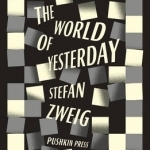World of Yesterday: Memoirs of a European
BookThis item doesn’t have any media yet
2009 | Biography
'The time provides the pictures, I merely speak the words to go with them, and it will not be so much my own story I tell as that of an entire generation - our unique generation, carrying a heavier burden of fate than almost any other in the course of history.' During his lifetime, Stefan Zweig's (1881-1942) works were immensely popular and widely translated. In the decades after his death, he was largely forgotten in the English-speaking world. Recent years, however, have witnessed a resurgence of interest in this singular author, and Pushkin Press has been at the forefront of this movement. TheWorld of Yesterday, Zweig's memoir, was completed shortly before his suicide. It charts the history of Europe from nineteenth-century splendour, decadence and complacency, through the devastation of the First World War, to the resultant brutality and depravity ofthe Nazi regime. The World of Yesterday is a heartfelt tribute to an age of humanity and enlightenment that Zweig feared was lost for ever. An incomparable record of a lost era, this is also essential reading for those who have already fallen in love with Zweig's fiction. 'One of the canonical European testaments...[
Zweig's] life and work tell of the perilous flimsiness of our world of security-a message that many insistently deny, but somehow need to hear' John Gray, New Statesman 'One of the greatest memoirs of the twentieth century' David Hare 'Stefan Zweig's time of oblivion is over for good...it's good to have him back' Salman Rushdie, The New York Times 'One of the joys of recent years is the translation into English of Stefan Zweig's stories' Edmund de Waal, author of The Hare with the Amber Eyes 'Zweig deserves to be famous again, and for good' Times Literary Supplement 'Indispensable' The Times Stefan Zweig was born in 1881 in Vienna, a member of a wealthy Austrian-Jewish family. He studied in Berlin and Vienna and was first known as a poet and translator, then as a biographer. Zweig travelled widely, living in Salzburg between the wars, and enjoyed literary fame. His stories and novellas were collected in 1934. In the same year, with the rise of Nazism, he briefly moved to London, taking British citizenship. After a short period in New York, he settled in Brazil where in 1942 he and his wife were found dead in bed in an apparent double suicide.
Related Items:
| Published by | Pushkin Press |
| Edition | Unknown |
| ISBN | 9781906548674 |
| Language | N/A |
Images And Data Courtesy Of: Pushkin Press.
This content (including text, images, videos and other media) is published and used in accordance
with Fair Use.
